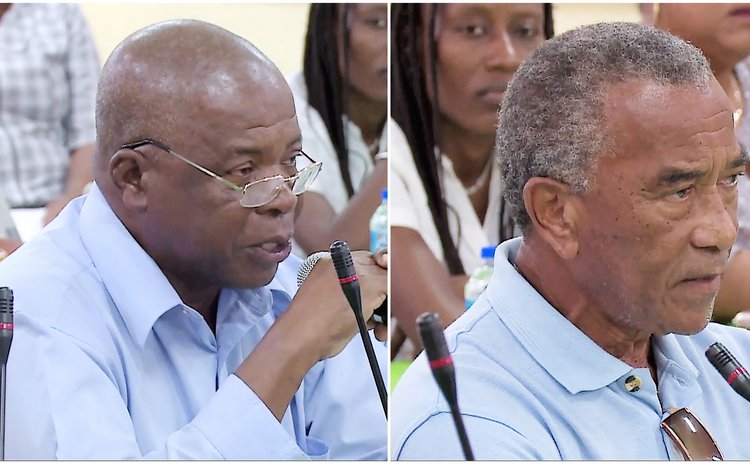Divided they fall
From our Archives: May Day 2015 Feature

Some say trade unions have lost their sting; others say they have adapted to circumstances
For four decades and counting Kertiste Augustus, the man who now heads the island's largest private sector representative body, the Waterfront and Allied Workers Union (WAWU), has dedicated his life to the trade union movement.
His journey for the cause has taken him through WAWU to the Caribbean Congress of Labour in Barbados - where he spent fifteen years as general secretary – and back home. During these many years he has fought bruising battles and savoured sweet victories on behalf of workers at home and in the region. He thought he had seen it all, until now.
"We have a situation where the minister of labour is not properly designated. Forty-four years involved in the labour movement and that is the first time we do not have a minister of labour specifically designated to us," Augustus told The Sun in an interview on the state of the labour movement here.
As workers around the country prepare to celebrate their day, there are suggestions that the trade union movement is in decline, with an insecure and demotivated workforce that is unwilling to carry on the struggle. The absence a dedicated minister in Prime Minister Roosevelt Skerrit's cabinet is being seen as a symptom of this decline. The very issues that led to a semi-resurgence of the labour movement in the mid-1990s when membership in the unions began growing again - job insecurity, layoffs, increasing unemployment and a fall in real wages - appear to be the very issues that have taken the militancy away from the movement. However, trade union leaders here contend that they have not lost their bite; they have simply taken a different approach that's more in line with today's realities.
"I don't think (it's right to say) that the labour unions are losing their bite. We have to become very cognizant of the period in which we operate. We are operating in a period that is stacked with economic problems that can affect the workers," Celia Nicholas, the president of the Dominica Association of Teachers (DAT), argued.
"If there is erring I prefer to err on the side of the worker. The time of saber rattling (is over). One has to see what is happening globally… and one has to take into consideration the interest of the workers who you represent," she added.
However the absence of industrial action hasn't escaped workers or employers, nor has the unions' repeated acceptance of little to no wage increases on behalf of their members. Earlier this year, the local chamber of commerce, the Dominica Employers Federation (DEF), complained that it was losing members because of the low rate of industrial action, along with the country's economic environment.
In expressing his dismay, Augustus described the DEF's statement as an "affront" to labour relations practitioners. And he has suggested to The Sun that the definition of trade union militancy has changed.
"If the yardstick for militancy was based on the number of strikes, you would have been absolutely correct to say that the militancy has gone. But has it gone to the detriment of the workers? I would say no," the WAWU leader stressed. The new way of achieving success, he maintained, is to seek speedy and amicable resolutions to disputes via tribunals, even while admitting that this method is not without its flaws. This, Augustus insisted, is better for the country. "No investors are willing to come if there is a strike every day," he avers. "We have lost the militancy in terms of strikes but we have gained more in terms of the speedy resolution (of disputes) among ourselves."
Like his counterparts, Thomas Letang, the general secretary of the Dominica Public Service Union (DPSU) believes that workers continue to appreciate the role of trade unions, claiming that, despite the economic situation, membership in his organization continues to grow.
But he accepts that the militancy that characterized the trade union movement in the 1970s no longer exists. "People are not as militant as they were. I think people are now more selfish; people are looking out for themselves. And it's not just the trade unions, it's the community as a whole," Letang told The Sun.
All three leaders opined that trade unions must go beyond negotiating wage increases and must now also focus on areas like education and training and other services. The unions have organised separate programmes for May Day, a situation that Augustus laments. It's been well over two decades that they have been talking about the formation of an umbrella body, however personalities seem to get in the way.
"I have come to the conclusion that we can only have a Trade Union Congress when certain people are no longer leaders of their unions," Letang concluded.
So, as workers observe May Day, the relationship among their union leaders remains strained at best and questions linger about the effectiveness of the trade union movement.
(First published as our May Day 2015 Special Feature on 27 April 2015).




